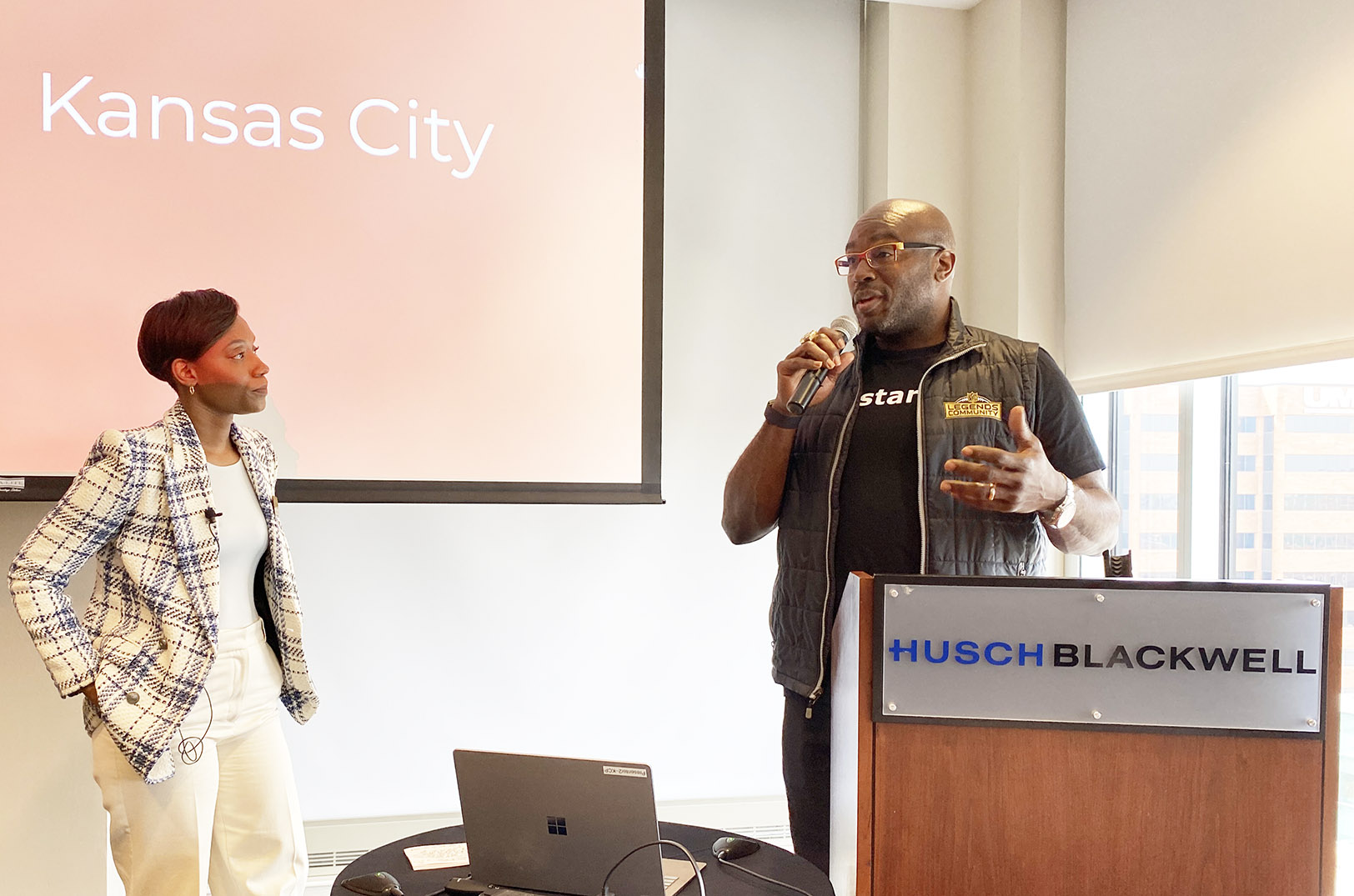A new-to-Kansas City nonprofit is expected to provide young adults from underrepresented backgrounds with workforce development training and placement into technology sector jobs, opening another pathway toward achieving educational, economic, and racial equity.
i.c.stars, headquartered in Chicago, launched in Kansas City in April — thanks in part to years of support from NFL Hall of Famer and former Kansas City Chiefs offensive guard Will Shields, through his Will to Succeed Foundation.
“Everybody doesn’t have a straight path,” said Shields, who in 2018 helped conduct a feasibility study to determine the need for i.c.stars in Kansas City.
“Coming back with all the reports done, Kansas City was a great spot to be able to build it out and find tech talent where tech talent isn’t currently found,” Shields added. “That’s people of color and people across the board who need it but can’t afford college. We sort of circumvent the college [path].”
After completing the i.c.stars workforce training program, graduates are then placed into technology jobs within corporate America, where they can begin breaking down barriers and providing new perspectives, Shields said.
“Once you come into our program, we call you a change agent,” he said. “Your job is to change the way people look at tech talent. … We’re training them to be a change agent, to take this opportunity to help whatever company you join to look at a different market in a different way.”
i.c.stars emphasizes the importance of being a “forever learner,” Shields said, adding that education must happen both among young tech workers and their employers.
“Education has to happen on both sides, which most people don’t think about,” he said. “We teach our cohorts to be forever learners, but then they also have to re-teach those in the corporate world that, ‘Hey, there are opportunities for you to have forever learners in your midst who haven’t had the two or four years of education.’”
“I think that’s breaking down those barriers of understanding that education happens in all different facets and all different ways,” Shields added. “But your mindset can’t be built in a box; it has to be grown, and it has to be cultivated.”
‘No problem is too big’
Founded in 1999 in Chicago, i.c.stars has expanded in recent years, adding locations in Milwaukee and Kansas City.
Across the organization’s 24 years, i.c.stars graduates have gone on to found 60 companies, according to Shields.
Cohort members participate in a rigorous 16-week paid training program, receiving a year’s worth of information during that time frame, Shields said.
“We want people who are leaders, people who are self-starters, and we look for certain qualities that we could help mold them into where they’ll be helping a business grow,” Shields said.
To be eligible, an individual must be at least 18 years old and six or more months out from graduating high school or GED completion. The program does not have a strict age maximum, Shields said, noting that i.c.stars could accept applicants up to age 40 or 50.
Interested applicants must also demonstrate financial need, and be available from 8 a.m. to 8 p.m. Monday through Friday during that 16-week period.
Following those 16 weeks as “interns,” participants become “residents” for the next 20 months, during which they receive professional and social service support.
Find out more about i.c.stars Kansas City and apply here.
Because of the program’s intensity, i.c.stars provides its cohorts with “full wraparound support,” Shields said, including social workers and financial advisors.
“We basically have to incorporate everything within your life that could be a deterrent, and try to make the pathway as easy as possible,” Shields said. “We have to be prepared as an organization to eliminate all the stressors, because we’re going to put enough stress on you as it is. … You still need to have the resilience, but also the understanding that we’re here to support you.”
Even after the two years, i.c.stars hopes that program graduates will stay connected to the organization, Shields added.
“You can always come home,” he said. “You can always come back if you want to get more training or understanding. No problem is too big for us to be able to help you manage your way forward.”
Find your happiest place
For Shields, his work with i.c.stars is just part of his commitment to improve the lives of Kansas Citians — and especially young people — through the Will to Succeed Foundation.
Now in its 30th year, the foundation began during Shields’ rookie year with the Chiefs, at the time focusing exclusively on women and children who were victims of domestic violence.
Over time, Shields said he and his wife, Senia, began to explore how they could expand the organization’s impact to combat inequity more broadly, especially among youth.
Shields said his parents, coaches, and teammates set an example for him at a young age, showing him the importance of giving back to the community.
“You’re part of the community, which gives you — not necessarily a higher calling — but it gives you an opportunity to be able to build the bridge and help others grow,” Shields said. “And if you have the opportunity, then why not take it?”
In terms of his work with i.c.stars Kansas City, Shields encouraged local businesses and leaders to get involved, whether through mentorship, employing graduates, financial contributions, or another avenue.
“We’re looking for everyone in corporate America to be a part of this,” he said. “Every business has an opportunity to use i.c.stars in one way or another.”
He also teased four to five big events that will be planned in Kansas City on a recurring basis in support of i.c.stars.
The main focus, however, remains on improving the lives of underserved young people, Shields said, noting that past program graduates have found jobs with salaries from 60 to 300 percent higher pay.
“To me, that’s the most fun part,” he said. “If you’re happy to go to work every day, you’re not worried about how much you’re gonna get paid — you’re just happy that you’re doing it. But, you’re getting paid enough to make a living wage.”
“Once you’re in, we’re planning on changing your life from that point forward,” he said. “We want to find out what makes you in your happiest place. Now, let’s find a way to make that a job for life.”









































